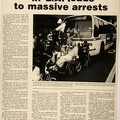DISCLOSURE
September-October 1989, Issue No. 112
the national newspaper of neighborhoods
[Headline] Disabled Protest Across Country: “Accessible Transit Is a Civil Right"
This story continues on 436 but is included here in its entirety for ease of reading.
PHOTO by Tom Olin: A large group of people in wheelchairs, on crutches, many carrying posters, are massed in front of a MCI New Jersey bus. Joe Carle is in the middle of the group with his back to the camera and on the back of his wheelchair is a sign that reads "I can't even get on the back of the bus." Also visible (right to left) are Cassie James, Diane Coleman, Brian Shea, Mike Early from CORD, two other guys in wheelchairs, Kent Killam, Julie Nolan, a white haired blind person with a big sign, and a short woman, perhaps a child, looking to her left and holding on to the back of a wheelchair. The group is blocking the bus and the street, while others walk by on the sidewalk.
Caption reads:
Members of American Disabled for Accessible Public Transit (ADAPT) and affiliated groups stages demonstratlon on disabled rights issues in front of buses at the federal court building, Philadelphia, May, 1989.
by Mike Monti
The message is clear: “We will ride,” say the members of American Disabled for Accessible Public Transit (ADAPT). From a series of demonstrations to a controversial court case, this relentless group keeps fighting for accessible transit around the country. Among its victories are a July, 1989 federal court ruling that transportation agencies no longer have a 3 percent cap in providing wheelchair lifts or paratransit.
For the members of ADAPT, accessible transit is a basic civil right — and is always worth fighting for. We reported in Disclosure #l08 on ADAPT’s actions in Montreal at the annual convention of the American Public Transit Authority (APTA). APTA and other transit authorities continue to make it extremely difficult for people with disabilities to use public transit. Nevertheless, ADAPT has shown that it will confront APTA wherever it shows up.
Last April, at the Western Regional Conference of APTA in Sparks, Nevada (just outside of Reno), over 125 ADAPT members staged actions at the conference, calling for public transportation that can be used by everyone — including people with disabilities.
Members started off with a march from their hotel to the conference hotel. When they were about halfway there, ADAPT was met by a police blockade. Obviously, authorities already knew about ADAPT: here is a group that won’t stops until it forces permanent changes.
In Sparks. the marchers were able to get around the police barriers. But when they got to APTA’s hotel, they were met by private security forces. The hotel security outnumbered the city’s police three-to-one -— and were able to chain the door shut before ADAPT entered. Forty-seven ADAPT members were arrested, and seven were sent to jail.
“The Sparks police had obviously decided that we weren't going to march in the streets,” said Stephanie Thomas, an ADAPT member who lives in Austin, Texas. “But we were able to go around the car barricades. it was like water going around the rocks."
The following afternoon, ADAPT staged another demonstration with many crawling across the street and around police barricades, blocking traffic until they reached the front door of the hotel. It was locked from the inside. This time, 25 were arrested. The charge: blocking a fire door which was locked.
Many of the ADAPT members who were arrested went on a hunger strike. Meanwhile, ADAPT members on the outside held a press conference calling attention to the problems jail staff were having providing for several of the disabled people’s needs.
A final protest was held the next day. One day later, the Sparks judge who sent the hunger strikers to prison made a deal with the protesters: he let out two protesters for the price of a $100 fine. The judge had imposed a much stiffer sentence a couple of days earlier, but changed his mind in the face of a group of arrested ADAPT members who made it clear that they would rather starve and stay in jail than pay a huge fine.
Meanwhile, disability groups on the east and west coasts were raising money to help support ADAPT. On the fourth day of the hunger strike, the judge relented and the fine was reduced. By the end of the day, all arrested ADAPT members had been released — and many in the group headed to Denver, for more demonstrations.
In Denver — which is the home of ADAPT — the group protested at the annual conference of the Urban Mass Transit Administration (UMTA). This time, demonstrations focused on the federal government's request for a re-hearing of the ADAPT vs. Burnley case.
In February, ADAPT won a major victory from the Department of Transportation (DOT) - only to have it undercut by the government. The first of ADAPT’s arguments stated that the rule saying transportation agencies should not have to spend more than 3 percent of their budget on wheelchair lifts or paratransit was unconstitutional.
Second, ADAPT held that the option allowing agencies to decide whether or not to provide new buses with wheelchair lifts was unconstitutional.
DOT kept flip-flopping on the issue: first it said yes, and then it backed off, asking for a rehearing to vacate the decisions.
In Denver, ADAPT confronted Michael Norton, U.S. Attorney for the
Tenth District in Denver. “Why is the government working against disabled rights?” asked ADAPT. Norton eventually read a 20-page statement from Attorney General Thornburgh stressing “the need for concern, compassion, and commitment” — but also saying that the law never mandated integration.
“It was a really offensive statement, ” said Stephanie Thomas. “On one hand, he was affirming the government's commitment, and on the other he’s fighting tooth and nail to stop rights for the disabled.”
When the case was reheard in Philadelphia on May 15, ADAPT was ready. With help from the local chapter of Disabled in Action and the Cape Organization for Rights of the Disabled (CORD), protesters gathered at the federal court building. Four ADAPT members met with the U.S. Attorney, who listened to their concerns.
Two days later, a protest was staged at Independence Hall. Dressed in revolutionary garb complete with wigs, three-cornered hats and fife and drum, the “Disability Rights Patriots” marched around the Liberty Bell.
Court Decision
On July 24, ADAPT won a significant victory as the original ruling striking down the 3 percent cap on wheelchair and paratransit lifts was upheld. On the local option issue, judges decided that the stipulation was legal. Now, it's back in the hands of DOT, for "clarification."
Meanwhile, ADAPT will be working with lawyers to plan its next strategy in the legal arena, even though the courts have dodged the issue of equal rights for the disabled.
Nevertheless, ADAPT is still ready for action. “We are not going to sit around and wait for the government to put a piece of legislation through,” said Wade Blank.
What's next for ADAPT? The next APTA Conference will be held in Atlanta, Georgia, September 23-28, 1989. “The court’s decision on local option will make our demonstrations in Atlanta bigger,” says Mike Auberger, a co-director of ADAPT.
Sparks Nevada, Denver, Philadelphia, Atlanta. . .ADAPT marches on for rights for people with disabilities. “Someday,” says Wade Blank, “ It will be just as appalling to see buildings without ramps as it was seeing signs that said ‘Whites Only.’ ”
end of article
Pictures of 2 graphic symbols: One is the ADAPT no-steps logo with American Disabled for Accessible Public Transit around the outside and a circle with a set of steps rising to the right and a bar across the circle and steps with the word ADAPT on it. The other is a power fist, with wheelchair warriors written below the arm.
Caption reads: These symbols are part of ADAPT’s continuing fight. Says Wade Blank of ADAPT “Someday it will be just as appalling to see buildings without ramps as it was seeing signs that said ‘Whites Only.’”
- Created on
- Thursday 11 July 2013
- Posted on
- Wednesday 7 October 2015
- Tags
- 3% cap, ADAPT - American Disabled for Accessible Public Transit, ADAPT no steps logo, ADAPT v. Burnley, APTA, arrested, Atlanta, Atty General Thornburgh, blocking a bus, Brian Shea, Cassie James, CORD, court, crawling, demonstration, Denver, DIA - Disabled in Action, Diane Coleman, Disclosure, hunger strike, Independence Hall, Joe Carle, Julie Nolan, Kent Killam, Liberty Bell, local option, Mike Auberger, Mike Early, NJ Transit, Philadelphia, Reno/Sparks, revolutionary war costumes, Stephanie Thomas, Tom Olin, UMTA, US Attorney, Wade Blank, We will ride, wheelchair lifts, Wheelchair power fist
- Albums
- Visits
- 11035
- Rating score
- no rate
- Rate this photo


0 comments